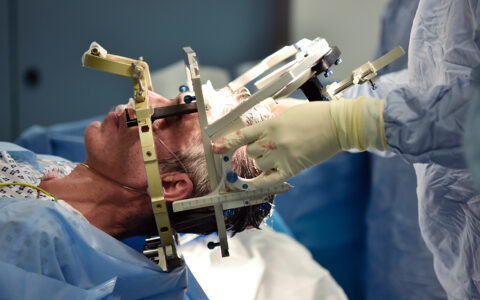Vanderbilt University Medical Center Department of Psychiatry and Behavioral Sciences is working to slow the progression of mental illness in young adults by intervening early in psychosis development, seeing the potential to attenuate or stop the disease in its tracks.
As part of the effort, the team is embracing NAVIGATE, a national, multipronged, early intervention program that evolved from the National Institutes of Mental Health RAISE (Recovery After the Initial Schizophrenia Episode) research initiative. Psychiatrist Maja Skikic, M.D., is one of the leaders in the NAVIGATE program at Vanderbilt.
Coordinated Care
Featuring a wraparound service model that includes patients, physicians and family members, NAVIGATE provides education about psychosis and relapse prevention. The program also targets substance abuse and suicidal thinking, and provides psychosocial programming to improve interpersonal relationships, work and school functioning, and independent living skills.
Research supports that this coordinated specialty care, provided early, leads to greater improvement in quality of life, psychopathology and engagement among participants in comparison with patients who are untreated or who engage with community care. Patients in NAVIGATE are more likely to stay in school or work, which could further improve symptoms, interpersonal relationships, and quality of life.
Key to effectiveness in reducing or eliminating symptoms are the program’s multipronged interventions, the researchers said.
Early Treatment Crucial
Skikic explains that in psychosis there is an “over-pruning” of some of the neural branches, leading to lost connections in the brain. Certain medications and perhaps even ancillary therapies like exercise and dance, she says, are among ways to grow or regrow these neural branches, especially when engaged during the first one to two years of illness onset.
“There’s something inherent about the experience of psychosis, whether related to excess dopamine or other factors, that seems to have a detrimental effect on the brain,” she said.
In some mental disorders, Skikic says neural circuitry and neurotransmitters have responded to early treatment, mending dysfunctional circuitry before it is deeply ingrained or inflicts damage.
Onset of psychosis typically occurs in the second or third decade of life, with initial episode symptoms manifesting with the appearance of visual or auditory hallucinations, paranoia, or changes in strongly held beliefs. At this point, Skikic says, there is still a chance to turn the tide.
“The affective symptoms, social withdrawal or a drop in grades, may start a year or more before they ever receive care,” Skikic said. “So, when they do come in, we don’t want to waste time.”
First-Episode Navigation
The Vanderbilt NAVIGATE team consists of Skikic, lead psychotherapist Kelly Vance, and a supported-employment specialist.
“The patient is ultimately at the center of this and decides who they want to be a part of their care.”
“We also match some patients with a peer support specialist, another team member who has undergone psychotic episodes,” Skikic said. “This interaction can be really impactful for a young individual who is essentially shell-shocked by what they have just experienced. But the patient is ultimately at the center of this and decides who they want to be a part of their care.”
First-line treatment for patients after a first psychotic episode have historically consisted of medications and limited psychotherapy. Medications have included antipsychotics, dopamine-blocking agents and adjunctive serotonin-modulators.
“We know glutamate, GABA, glycine, serotonin, dopamine, and other neurotransmitters play big roles in the dysfunction within psychosis,” Skikic said. “Unfortunately, many medications that we have do not target the relevant, specific pathways and may also have some very deleterious side effects.”
She says that serotonin targeting is an exception to this, and that some serotonin agonists are combined with partial or complete dopamine antagonists with varying degrees of success.
Cognitive Interventions
While medications are still generally the first-line treatment, NAVIGATE takes a broad approach that may include several strategies.
Patients with primary symptoms of mania are offered positive cognitive behavioral therapy as well, which Skikic says can strengthen executive network systems and downregulate more primitive brain processes.
Recovery-oriented cognitive therapy, developed by Vanderbilt assistant professor of psychiatry and behavioral sciences Aaron Brinen, Psy.D., under the tutelage of the late cognitive behavior therapy pioneer Aaron T. Beck, M.D., focuses on treating negative symptoms of psychosis, like apathy and avolition.
Movement therapy, and other motor-based interventions may improve the disorganized and negative behaviors characteristic of psychosis.
Promise of Neuromodulation
“For some patients, adjunctive neuromodulation therapies like electroconvulsive therapy (ECT) and transcranial magnetic stimulation are particularly effective. We know that ECT stimulates growth of the neural branches and can be especially helpful in the first few years of illness,” Skikic said.
“At the same time, for patients who have a strong affective component and psychomotor symptoms, particularly catatonia, neuromodulation therapies remain an effective intervention at later stages of illness.”
The NAVIGATE program has been prioritized for funding by the chair of the Department of Psychiatry and Behavioral Sciences at Vanderbilt, Stephan Heckers, M.D., and also has philanthropic support. In its sixth year of operation, it is serving 20-25 patients at any given time.




